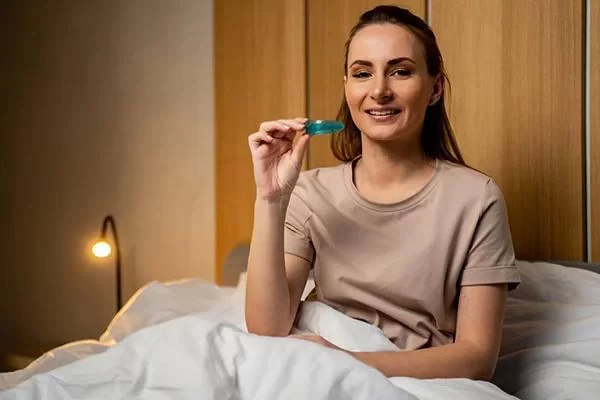
Sleep Apnea Dental Appliances for Better Sleep
- Understanding Sleep Apnea
- How Dental Appliances Work for Sleep Apnea
- Benefits of Dental Appliances for Better Sleep
- Types of Dental Appliances for Sleep Apnea
- Why Choose Dental Appliances Over CPAP
1. Understanding Sleep Apnea
Sleep apnea is a common condition that affects millions of people worldwide. It occurs when your breathing repeatedly stops and starts during sleep. The most common type, obstructive sleep apnea, happens when the muscles in the back of your throat relax too much and block the airway. This results in disrupted sleep, snoring, and often, daytime fatigue. For many individuals, traditional treatments like CPAP (Continuous Positive Airway Pressure) machines can feel uncomfortable and intrusive. As a result, more people are turning to sleep apnea dental appliances as a comfortable alternative.
2. How Dental Appliances Work for Sleep Apnea
Dental appliances, also known as mandibular advancement devices (MADs), work by repositioning your lower jaw and tongue to keep the airway open during sleep. These appliances are typically custom-fitted by a dentist to ensure comfort and effectiveness. They help prevent the collapse of the airway, which is the primary cause of snoring and breathing interruptions in people with sleep apnea. By gently shifting the jaw forward, dental devices can provide significant relief from symptoms and improve sleep quality.
3. Benefits of Dental Appliances for Better Sleep
There are several key benefits to using dental appliances for sleep apnea treatment:
- Improved Comfort: Dental appliances are often more comfortable than CPAP machines, which can be noisy and require wearing a mask. These devices are small, portable, and easy to use, making them ideal for travel or at-home use.
- Reduced Snoring: One of the most immediate benefits is a significant reduction in snoring. Many users report a quieter, more restful night’s sleep after using dental appliances.
- Better Sleep Quality: By preventing airway obstruction, dental appliances can help you sleep more soundly and wake up feeling more rested and energized.
- Non-Invasive: Unlike surgery or other treatments, dental appliances are non-invasive and require no recovery time.
4. Types of Dental Appliances for Sleep Apnea
There are several types of dental appliances available for sleep apnea treatment. Some of the most popular options include:
- Mandibular Advancement Devices (MADs): These devices work by pushing the lower jaw forward to prevent airway collapse. They are the most commonly used dental appliance for sleep apnea.
- Tongue Retaining Devices (TRDs): These devices hold the tongue in a forward position to prevent it from blocking the airway. They are typically used for individuals who cannot tolerate MADs.
- Hybrid Devices: These combine features of both MADs and TRDs, providing a more customizable solution for patients with specific needs.
5. Why Choose Dental Appliances Over CPAP
While CPAP machines are considered the gold standard for sleep apnea treatment, many individuals find them difficult to use consistently. Dental appliances offer a viable alternative that can be equally effective for many patients. Here are a few reasons why you might prefer dental appliances:
- Comfort: Dental appliances are less bulky and easier to wear compared to CPAP machines, which require a mask and tubing.
- Portability: Dental appliances are small and travel-friendly, unlike the large, cumbersome CPAP machines.
- Quiet: Unlike CPAP machines, dental appliances do not make noise, providing a quieter and more peaceful sleep environment.
- Cost-Effective: Dental appliances are often more affordable than CPAP machines, making them a great option for those looking for a budget-friendly solution.
If you're interested in learning more about sleep apnea dental appliances and how they can improve your sleep, visit Dentistry Toothtruth to explore more options and find a solution that works for you!







 Westgate Dental Arts
Westgate Dental Arts Coventry Family Dental
Coventry Family Dental Familia Dental
Familia Dental Dr. Daniel S. Fife, DDS
Dr. Daniel S. Fife, DDS Dentistry At Suburban Square: Michael I. Wollock, DMD
Dentistry At Suburban Square: Michael I. Wollock, DMD Comfort Care Dental
Comfort Care Dental The Importance of Oral Health Education During Pregnancy for a Healthy Pregnancy
The Importance of Oral Health Education During Pregnancy for a Healthy Pregnancy Why Skipping Dental Checkups Can Lead to Bigger Oral Health Problems
Why Skipping Dental Checkups Can Lead to Bigger Oral Health Problems Advantages of Porcelain Dental Restorations
Advantages of Porcelain Dental Restorations Best Tips for Brushing Your Teeth Properly for Healthy Gums: Essential Techniques for Oral Health
Best Tips for Brushing Your Teeth Properly for Healthy Gums: Essential Techniques for Oral Health How Can Diabetes Cause Tooth and Gum Problems? Preventing and Managing Oral Health Issues
How Can Diabetes Cause Tooth and Gum Problems? Preventing and Managing Oral Health Issues Healthy Habits for Promoting Good Oral Health and Hygiene: Tips for a Healthy Smile
Healthy Habits for Promoting Good Oral Health and Hygiene: Tips for a Healthy Smile